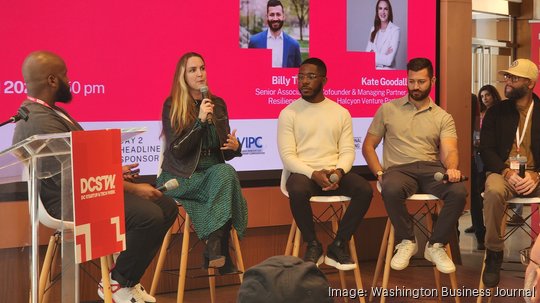
The days of startups being able toraise millions of dollars from investors on ideas alone are over.
If a startup doesn't already have a base of customers and a clear strategy for obtaining new ones, many venture capital firms are not interested in cutting checks, a group of investors said this week during a panel discussion at DC Startup & Tech Week. Capital is more expensive than it was before the Federal Reserve started raising interest rates in 2022, so investors can't afford to wait years and years for startups, no matter how promising, to generate meaningful revenue.
"Back in 2021, the common theme was that companies were getting funded with a back-of-napkin idea," William Leonard, an investor at Atlanta-based investment firm Valor Ventures, said during a panel titled "What's getting funded, and why?"
"Everyone was building with blockchain or Web 3 and using buzzwords to go out and raise basically free money because of the zero interest rate environment," he said.
Throughout the discussion, investors also warned of red flags they are seeing from young companies new to the capital-raising process. These include wishy-washy plans for capturing market share and not being forthcoming about how they are using existing funding.
DC Startup & Tech Week is an annual series of events attended by thousands of people looking to learn about, support and advocate for startups and the broader tech scene. Along with Leonard, the investor panel, held at JBG Smith's National Landing Experience Center in Crystal City and attended by over 100 people, included: Anthony Obi Jr., senior investment associate at Virginia Venture Partners; Christopher King, managing partner at Theo Advisors; Billy Taki, senior associate at ResilienceVC: and Kate Goodall, co-founder and managing partner, Halcyon Venture Partners.
Leonard and the others told the assembled entrepreneurs that the key to landing outside investment these days is having go-to-market strategies that will yield paying customers. For software startups, this could include customers using beta or pilot programs, so long as these demos lead to paying client conversions, said Leonard, whose firm funds startups across the southern U.S., including those in the D.C. region.
That's a change from expectations for startups in recent years, when just having a working demo or proposal — but no customer base — could garner funding from investors.
"Capital efficiency, a focus on customers, a focus on revenue, is really what we're seeing get funded today," Leonard said.
He noted that by Valor's criteria, a startup seeking seed funding between $1 million and $5 million needs to be generating several hundred thousand dollars in annual recurring revenue.
Taki, from D.C.-based investment firm ResilienceVC, echoed that sentiment, but noted that all VC firms have different criteria for what minimum revenue should be and that the criteria will shift over time based on market conditions.
"It's really just a market, it's nothing personal or nothing about the quality of the business, as much as it's just the market correcting or changing," Taki said. "It will change again over time. But I think it's important to recognize where it is right now."
At Georgetown-based Halcyon Venture Partners, Goodall said a trend she's noticing in investment conversations with startups is that founders aren't coming to Halycon with a clear plan for capturing market share in the future.
"Even if it's something very novel and new, I still want to know, you have to convince me that there is a market and that you're going to get it somehow," Goodall said. "If you can't do that, if I can't look at your materials and really have conviction around that, then I would go back and have you look at it again. If your competitive analysis doesn't convince you that you're competitive, it's not going to convince me."
She added that a company's data room — a space physical or virtual in nature that houses important company documents like those relating to finances and customer details — must be continually updated when investors get access to it.
Leonard said that delaying access to that data room, for whatever reason, is a red flag, and yet is something he's seeing from some startups.
"In early-stage fundraising, momentum is very important because deals move quick, and you need to show the investor that you have a sense of urgency," Leonard said. "Before you go out and start taking investor meetings, your data room needs to be ready and assembled."




